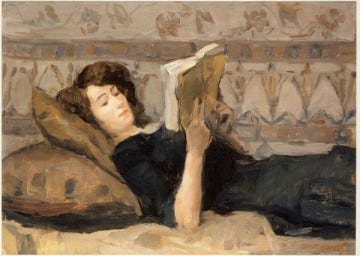I’m taking a quick detour from my decan walk this week1 to explore a bookish topic I’ve had on my mind for a while. I almost wrote about it a few weeks ago in response to something I’ve seen mentioned on two different substacks - both posts in question had a decidedly different view than the one I’m about to present. But then I read the audiobook Everything Sad is Untrue and I had so much to say, so this gets its own special post.
This debate first came to my attention this past winter at a party when some friends asked me to choose sides in a marital disagreement: is listening to an audiobook the same as reading the book? At the time I could see both of their sides and didn’t have a strong opinion either way, and we all were a little tipsy and went back to drinking our holiday cocktails anyway…but now I do have a strong opinion, and it is this: listening to audiobooks is reading. Full stop.
I am an educator and parent who has spent professional and personal time researching literacy, I have enthusiastically taught my own kids to read, I sold kids books and hosted a traveling story-time for a spell, and I am an unabashed novel reader2. Those are my credentials for this short persuasive essay.
First off, do you know how many entries there are for the word read in my dictionary app? 47!! I find that hilarious. How can one word have forty-seven nuanced definitions? It can be a noun, an idiom, a verb with an object, a verb without an object, a phrase, or an adjective! You can read a person’s fortune. You can read lips or minds or between the lines! My spouse might read the green before he plays a round of golf. You can proofread, or read a person’s thoughts, you can peruse written material, or utter those same words aloud - all reading! A new novel can be a wonderful read, and you must be a well-read person for having read it. Ok, you get my drift. Reading means a lot of things.

As I’ve thought about this question, whether listening to an audiobook is really reading the book, I can’t help but think we need a clear definition of the word! So I will give you mine:
DEFINITION FOR READ: verb (used with object) read [reed]
1. to make meaning of a text (by looking, listening, or touch) for discussion, critique or enjoyment! to read a book; to read an audiobook; to read a braille book.
Ok, now that you have a concise definition to share with all your friends, I’m sure you can see why I feel so strongly that reading audiobooks is …reading. But if it’s still not clear to you, here is a list of more reasons why I am right.
When you read a book do you say, “I just looked at the most amazing book!” No, you just read the most amazing book, it just happened to be in written format. There are many formats: paper book, e-readers, braille books, audio.
Our brains are wonderfully diverse and there are many different ways to use our senses to read (decode & make meaning) - people who are blind, have dyslexia, ADHD, a multitude of other disabilities3 can still READ!
Before my kids learned to read we read aloud a LOT. There are so many benefits to hearing books read aloud: fluency! vocabulary! pronunciation! community! joy!
“Audiobooks are “another form of art” - but they’re not reading.” Nope. This past winter I listened to an amazing dramatization of Susan Cooper’s The Dark is Rising. This was a radio show. It was magical and “another form of art” - but maybe next winter I’ll read the audiobook!
“But you can multitask while you listen to audiobooks, so you’re distracted and not really reading!” Have you tried reading on the internet4? Or reading a paper book while parenting three children? It’s still reading.
Who made you the gatekeeper of literary joy? In a world where attention spans are diminishing by the tweet, why would we gatekeep reading anyway? More books! More joy! Why are you being a bookish curmudgeon??
I am sure you are convinced by now, but I will wrap this up with two stories from my own life. The first happened just a few weeks ago at my 5th grader’s spring music concert. Our school’s music teacher is a gem and he hosted an awesome medieval show about “ambition, honor, and heavy metal” and throughout the concert the student’s read from a book called Knight Owl with the picture book pages projected up on a screen. The pages were too small to actually read the text with my eyes, but by the end of the night the kids read aloud the whole book. Did we leave that show having heard a fantastic rendition of “Cry Thunder” and having read a sweet book about a tiny owl who wants to be a knight? Yes, yes we did.
Finally, when I was pregnant with my second kid and parenting a toddler, I had zero time to read with my eyeballs. I would go for walks at my local park and listen to Anna Karenina. I still remember beautiful passages of that book just by the location I was along the trail when I heard it. I would’ve never had the time to sit with that text when I was in the throes of early parenthood!
How lucky we are to be alive right now - with so many amazing ways to read!
But never fear, we’ll be back next week with Gemini season! Hurray!
Fanny Price says this line in the film adaptation of Jane Austen’s lesser known, but more socially critical book Mansfield Park.
Don’t even get me started on ASL books! When I taught story time I would occasionally weave signing in with our stories, but then a friend (who is a CODA) helped me to understand that ASL is a rich language and offering a few random vocabulary words to hearing kids is not exactly helpful or inclusive. You can find hundreds of stories on YouTube that have been interpreted with ASL - my kids love to read along! You can find some of our favorites HERE.






I didn't realize this was even still a debate! I don't listen (read) to many audiobooks but that's for very specific reasons: if it's nonfiction for research, I take a LOT of notes on the page to reference later. Maybe someone else would do that easily with audiobooks, but for me physical books are easiest to make notes in. I listen to a lot of podcasts for research, too, so at some point in each day am just tired of inputs, audio and screens, and want quiet. But yeah, differentiating seems odd to me. It's not just that reading is reading but that stories are stories! I used to listen to more audiobooks before my kids were born (on tape and CD), and then eased into kids' stories for long car drives because some of the readers are so fun. Upside-Down Magic is a particular favorite series.
This was a very enjoyable read, which I think would have been just as persuasive if I had of read it through an audiobook 😉